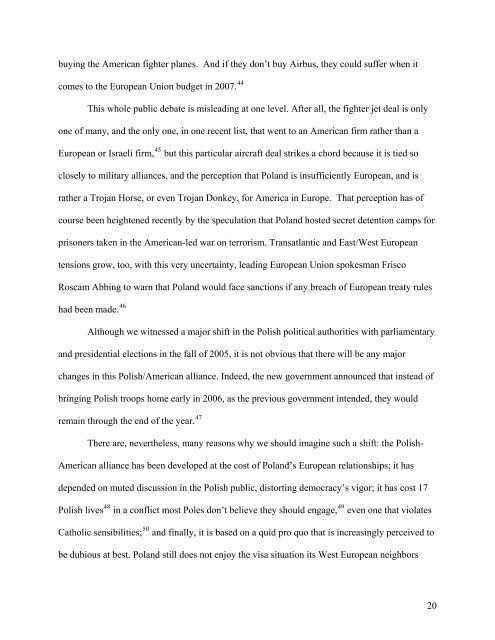from transition to hegemony - The Watson Institute for International ...
from transition to hegemony - The Watson Institute for International ...
from transition to hegemony - The Watson Institute for International ...
Create successful ePaper yourself
Turn your PDF publications into a flip-book with our unique Google optimized e-Paper software.
uying the American fighter planes. And if they don’t buy Airbus, they could suffer when it<br />
comes <strong>to</strong> the European Union budget in 2007. 44<br />
This whole public debate is misleading at one level. After all, the fighter jet deal is only<br />
one of many, and the only one, in one recent list, that went <strong>to</strong> an American firm rather than a<br />
European or Israeli firm, 45 but this particular aircraft deal strikes a chord because it is tied so<br />
closely <strong>to</strong> military alliances, and the perception that Poland is insufficiently European, and is<br />
rather a Trojan Horse, or even Trojan Donkey, <strong>for</strong> America in Europe. That perception has of<br />
course been heightened recently by the speculation that Poland hosted secret detention camps <strong>for</strong><br />
prisoners taken in the American-led war on terrorism. Transatlantic and East/West European<br />
tensions grow, <strong>to</strong>o, with this very uncertainty, leading European Union spokesman Frisco<br />
Roscam Abbing <strong>to</strong> warn that Poland would face sanctions if any breach of European treaty rules<br />
had been made. 46<br />
Although we witnessed a major shift in the Polish political authorities with parliamentary<br />
and presidential elections in the fall of 2005, it is not obvious that there will be any major<br />
changes in this Polish/American alliance. Indeed, the new government announced that instead of<br />
bringing Polish troops home early in 2006, as the previous government intended, they would<br />
remain through the end of the year. 47<br />
<strong>The</strong>re are, nevertheless, many reasons why we should imagine such a shift: the Polish-<br />
American alliance has been developed at the cost of Poland’s European relationships; it has<br />
depended on muted discussion in the Polish public, dis<strong>to</strong>rting democracy’s vigor; it has cost 17<br />
Polish lives 48 in a conflict most Poles don’t believe they should engage, 49 even one that violates<br />
Catholic sensibilities; 50 and finally, it is based on a quid pro quo that is increasingly perceived <strong>to</strong><br />
be dubious at best. Poland still does not enjoy the visa situation its West European neighbors<br />
20
















